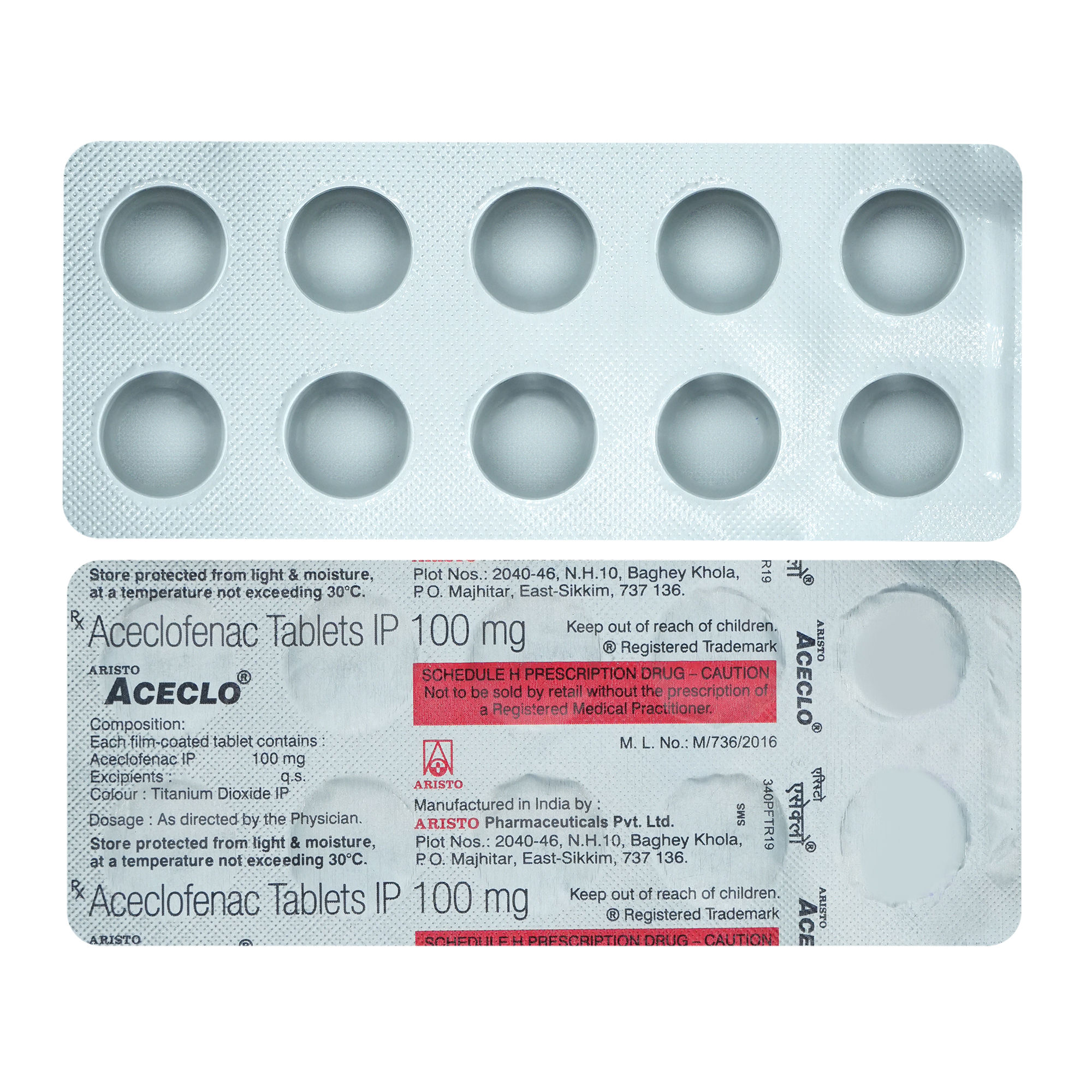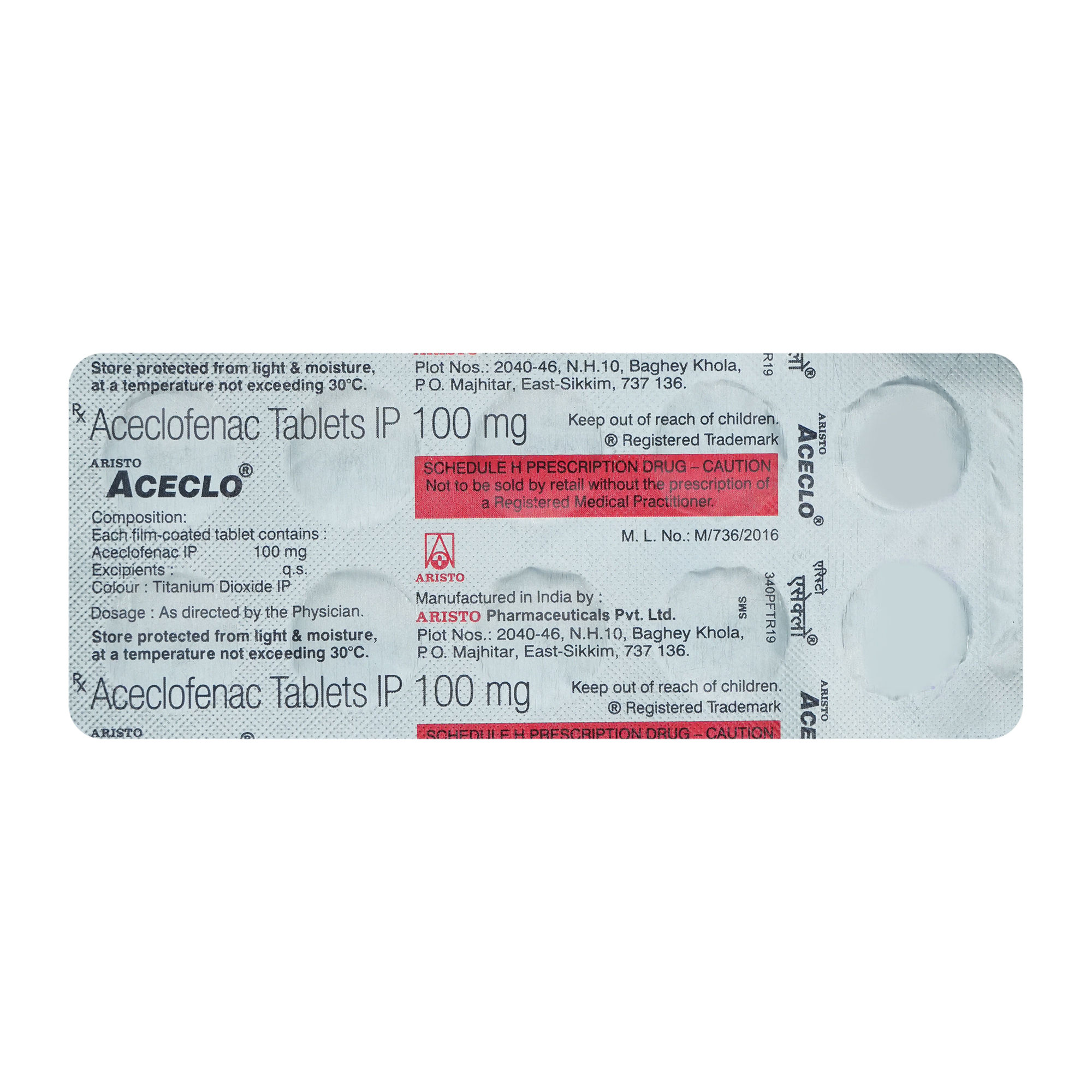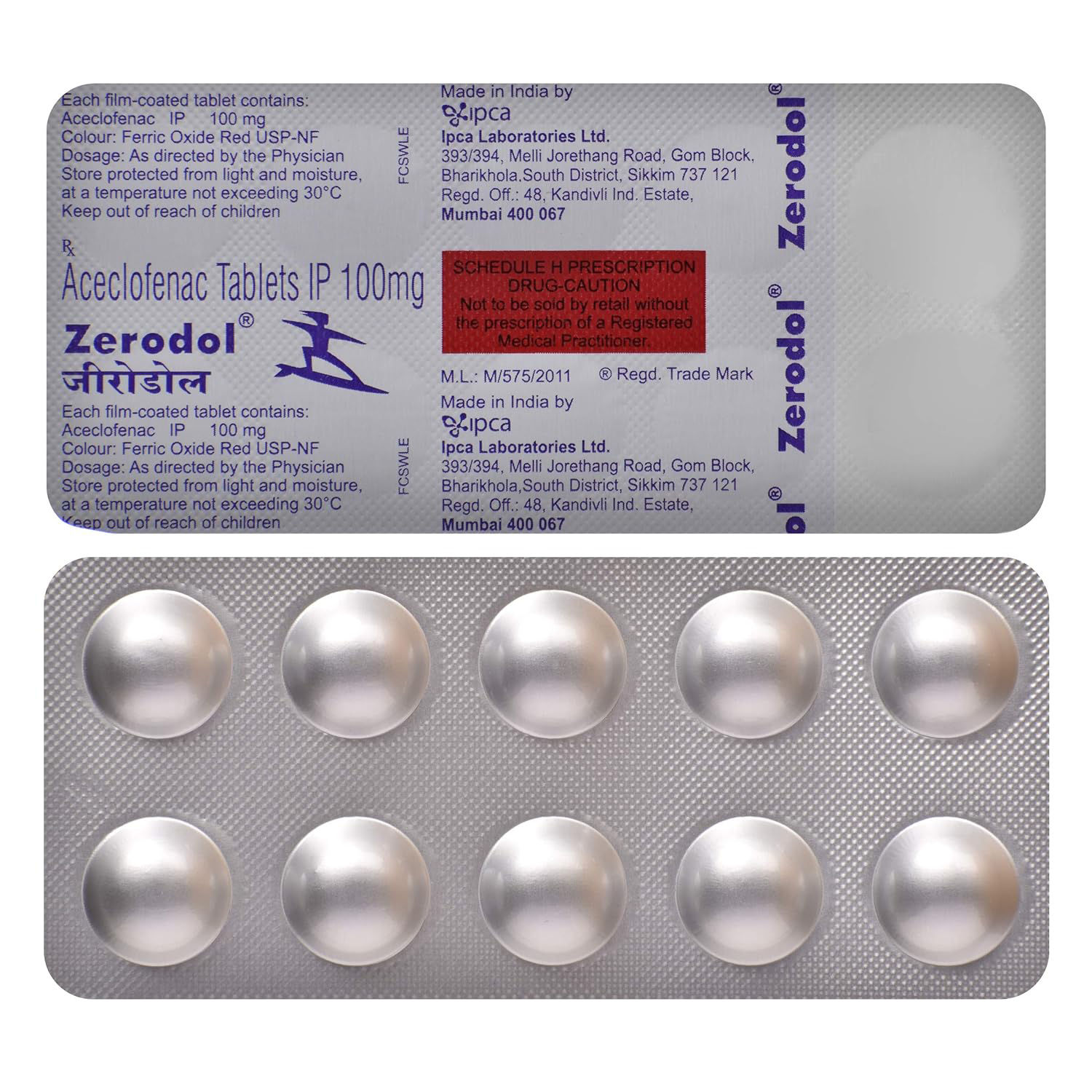Aceclo Tablet 10's



₹54.9*
MRP ₹61
10% off
₹51.85*
MRP ₹61
15% CB
₹9.15 cashback(15%)
Free Delivery
With Circle membership
(Inclusive of all Taxes)
This offer price is valid on orders above ₹800. Apply coupon PHARMA10/PHARMA18 (excluding restricted items)
Aceclo Tablet is used to reduce and relieve pain, and inflammation (swelling) associated with osteoarthritis, rheumatoid arthritis and ankylosing spondylitis. It contains Aceclofenac, which reduces the production of prostaglandins and helps in reducing mild to moderate pain and inflammation. In some cases, it may cause certain common side effects such as dizziness, diarrhoea, nausea, and increased liver enzymes in the blood. Before taking this medicine, you should tell your doctor if you are allergic to any of its components or if you are pregnant/breastfeeding, and about all the medications you are taking and pre-existing medical conditions.
Know Your Delivery Time
Provide Delivery Location
Available Offers
 Prescription drug
Prescription drugWhats That

Secure Payment

India's Most Trusted Pharmacy

Genuine Products
Composition :
Manufacturer/Marketer :
Consume Type :
Return Policy :
Expires on or after :
About Aceclo Tablet
Aceclo Tablet belongs to a group of medicines called Non-Steroidal Anti-Inflammatory Drugs (NSAIDs) or painkillers. These drugs are used to reduce and relieve pain and inflammation (swelling) associated with osteoarthritis, rheumatoid arthritis, and ankylosing spondylitis. Arthritis is a condition that affects the joints. Symptoms include swelling, pain, inflammation, stiffness, and tenderness.
Aceclo Tablet contains 'Aceclofenac', which works by blocking the effect of a chemical messenger known as cyclo-oxygenase (COX) enzyme that makes other chemical prostaglandins. By blocking the effect of COX enzymes, fewer prostaglandins are produced. This helps in reducing mild to moderate pain and inflammation at the injured or damaged site.
In some cases, Aceclo Tablet may cause certain common side effects such as dizziness, diarrhoea, nausea, and increased liver enzymes in the blood. Most of these side effects do not require medical attention and will resolve gradually over time. However, you are advised to talk to your doctor if you experience these side effects persistently.
Consult your doctor if you are pregnant or breastfeeding. Aceclo Tablet may cause drowsiness and dizziness, so drive with caution. Aceclo Tablet is not recommended for children as safety and efficacy have not been established. Avoid consuming alcohol along with Aceclo Tablet as it could lead to increased drowsiness and dizziness; it might also increase the risk of stomach bleeding. Keep your doctor informed about your health condition and medicines to rule out any side effects.
Uses of Aceclo Tablet
Directions for Use
Medicinal Benefits
Aceclo Tablet belongs to a group of medicines called Non-Steroidal Anti-Inflammatory Drugs (NSAIDs) used to reduce and relieve pain, redness, and inflammation (swelling) in patients suffering from osteoarthritis, rheumatoid arthritis and ankylosing spondylitis. Aceclo Tablet works by blocking the effect of a chemical messenger known as cyclo-oxygenase (COX) enzyme that makes other chemical prostaglandins, which are produced at injury sites and cause pain and swelling. By blocking the effect of COX enzymes, fewer prostaglandins are produced. This helps in reducing mild to moderate pain and inflammation at the injured or damaged site.
How Aceclo Tablet Works
Storage
- Inform your doctor about dizziness symptoms. They may adjust your medication regimen or prescribe additional medications to manage symptoms.
- Follow your doctor's instructions for taking medication, and take it at the same time every day to minimize dizziness.
- When standing up, do so slowly and carefully to avoid sudden dizziness.
- Avoid making sudden movements, such as turning or bending quickly, which can exacerbate dizziness.
- Drink plenty of water throughout the day to stay hydrated and help alleviate dizziness symptoms.
- If you're feeling dizzy, sit or lie down and rest until the dizziness passes.
- Track when dizziness occurs and any factors that may trigger it, and share this information with your doctor to help manage symptoms.
- Take medications with food (if recommended): It can help prevent stomach distress and indigestion.
- Eat smaller, more frequent meals: Divide daily food intake into smaller, more frequent meals to ease digestion.
- Avoid trigger foods: Identify and avoid foods that trigger indigestion, such as spicy, fatty, or acidic foods.
- Stay upright after eating: Sit or stand upright for at least 1-2 hours after eating to prevent stomach acid from flowing into the oesophagus.
- Avoid carbonated drinks: Avoid drinking carbonated beverages, such as soda or beer, which can worsen indigestion.
- Manage stress: To alleviate indigestion, engage in stress-reducing activities like deep breathing exercises or meditation.
- Consult a doctor if needed: If indigestion worsens or persists, consult a healthcare professional to adjust the medication regimen or explore alternative treatments.
- Apply a hot/cold pack to the affected area.
- Doing gentle exercises can help cope with pain by stretching muscles.
- Get enough sleep. It helps enhance mood and lower pain sensitivity.
- Avoid alcohol, smoking and tobacco as they can increase pain.
- Follow a well-balanced meal.
- Meditation and massages may also help with pain.
- Inform your doctor about the nausea and discuss possible alternatives to the medication or adjustments to the dosage.
- Divide your daily food intake into smaller, more frequent meals to reduce nausea.
- Opt for bland, easily digestible foods like crackers, toast, plain rice, bananas, and applesauce.
- Avoid certain foods that can trigger nausea, such as fatty, greasy, spicy, and smelly foods.
- Drink plenty of fluids, such as water, clear broth, or electrolyte-rich beverages like coconut water or sports drinks.
- Use ginger (tea, ale, or candies) to help relieve nausea.
- Get adequate rest and also avoid strenuous activities that can worsen nausea.
- Talk to your doctor about taking anti-nausea medication if your nausea is severe.
- Record when your nausea occurs, what triggers it, and what provides relief to help you identify patterns and manage your symptoms more effectively.
- Inform Your Doctor: Notify your doctor immediately about your diarrhoea symptoms. This allows them to adjust your medication or provide guidance on managing side effects.
- Stay Hydrated: Drink plenty of fluids to replace lost water and electrolytes. Choose water, clear broth, and electrolyte-rich drinks. Avoid carbonated or caffeinated beverages to effectively rehydrate your body.
- Follow a Bland Diet: Eat easy-to-digest foods to help firm up your stool and settle your stomach. Try incorporating bananas, rice, applesauce, toast, plain crackers, and boiled vegetables into your diet.
- Avoid Trigger Foods: Steer clear of foods that can worsen diarrhoea, such as spicy, fatty, or greasy foods, high-fibre foods, and dairy products (especially if you're lactose intolerant).
- Practice Good Hygiene: Maintain good hygiene to prevent the spread of infection. To stay healthy, wash your hands frequently, clean and disinfect surfaces regularly, and avoid exchanging personal belongings with others.
- Take Anti-Diarrheal Medications: If your doctor advises, anti-diarrheal medications such as loperamide might help manage diarrhoea symptoms. Always follow your doctor's directions.
- Keep track of your diarrhoea symptoms. If they don't get better or worse or are accompanied by severe stomach pain, blood, or dehydration signs (like extreme thirst or dark urine), seek medical help.
What if I have taken an overdose of Aceclo Tablet
Drug Warnings
If you have had any recent heart surgery, do not take Aceclo Tablet as it can increase the risk of heart attack or stroke. Do not take Aceclo Tablet if you are allergic to aceclofenac or other NSAIDs (such as ibuprofen, diclofenac or naproxen); if you have stomach ulcers, have suffered bleeding problems, clotting problems, severe heart, liver or kidney problems. Inform your doctor if you have or have had disorders of the stomach, blood circulation problems to the brain, asthma, porphyria (blood disorder), diabetes, high blood pressure, auto-immune diseases, connective tissue diseases; if you are recovering from major surgery or if you are elderly. Consult your doctor if you are pregnant or breastfeeding. Aceclo Tablet may cause drowsiness and dizziness, so drive only if you are alert. Aceclo Tablet is not recommended for children as safety has not been established. Avoid consuming alcohol along with Aceclo Tablet as it could lead to increased drowsiness and may also increase the risk of stomach bleeding. Stop taking Aceclo Tablet and consult your doctor immediately if you have stomach pain or any signs of bleeding in the intestine or stomach, such as blood in stools. Do not take any other NSAIDs for pain relief along with Aceclo Tablet unless prescribed.
Drug-Drug Interactions
Drug-Drug Interactions
Login/Sign Up
Co-administration of Atenolol with Aceclo Tablet could increase the risk of low blood pressure.
How to manage the interaction:
Although there is a possible interaction between Atenolol and Aceclo Tablet, you can take these medicines together if prescribed by a doctor. Consult a doctor if you experience excessive sweating, shortness of breath, palpitations, or chest discomfort. Do not discontinue any medications without consulting a doctor.
Drug-Food Interactions
Drug-Food Interactions
Login/Sign Up
Diet & Lifestyle Advise
- Physical activity strengthens muscles and relieves joint stiffness. Gentle activities like 20-30 minutes of walking or swimming are helpful.
- Performing yoga may also help in improving joint flexibility and pain management.
- Maintain a healthy weight by performing regular low-strain exercises and eating healthy food.
- Get adequate sleep, as resting the muscles can help in reducing inflammation and swelling.
- Follow heat or cold therapy, and regularly apply a cold or hot compress on the joints for 15-20 minutes.
- De-stress yourself by meditating, reading books, taking a warm bubble bath or listening to soothing music.
- Acupuncture, massage and physical therapy may also be helpful.
- Eat food rich in antioxidants such as berries, spinach, kidney beans, dark chocolate, etc.
- Foods containing flavonoids help in reducing inflammation. These include soy, berries, broccoli, grapes and green tea.
- Avoid smoking and alcohol consumption.
Habit Forming
Therapeutic Class
Product Substitutes
Alcohol
Unsafe
Avoid consumption of alcohol while taking Aceclo Tablet as it may cause increased drowsiness. It can also increase the risk of stomach bleeding.
Pregnancy
Caution
Please consult your doctor if you have any concerns about this. Your doctor will prescribe only if the benefits outweigh the risks.
Breast Feeding
Caution
It is not known if Aceclo Tablet passes into breastmilk. Please consult your doctor before taking Aceclo Tablet ; your doctor will decide whether Aceclo Tablet can be taken by breastfeeding mothers or not.
Driving
Caution
Aceclo Tablet may cause drowsiness, dizziness and tiredness. Do not drive or operate machinery unless you are alert.
Liver
Caution
Dose adjustment may be needed in patients with liver impairment. Please consult your doctor if you have a liver impairment or any concerns regarding this.
Kidney
Caution
Dose adjustment may be needed in patients with kidney impairment. Please consult your doctor if you have kidney impairment or any concerns regarding this.
Children
Unsafe
Aceclo Tablet is not recommended for children as the safety and effectiveness were not established.

Have a query?
FAQs
Aceclo Tablet is used to reduce and relieve pain and inflammation (swelling) associated with osteoarthritis, rheumatoid arthritis and ankylosing spondylitis.
Aceclo Tablet works by blocking the effect of chemical messengers that causes pain and swelling. This helps in reducing mild to moderate pain and inflammation at the injured or damaged site.
Do not take Aceclo Tablet for longer durations as it might increase the risk of heart problems and stomach bleeding. Do not exceed the dose and duration of treatment prescribed by the doctor.
To treat your condition effectually continue taking Aceclo Tablet for as long as prescribed. Do not be reluctant to speak with your doctor if you feel any difficulty while taking Aceclo Tablet .
Taking Aceclo Tablet with pain killers like aspirin and ibuprofen can elevate symptoms of gastric ulcer and bleeding. So, talk to your doctor if you have gastrointestinal bleeding or other bleeding problems like haemophilia before using Aceclo Tablet .
Diarrhoea might be a side-effect of Aceclo Tablet . Drink enough fluids and eat non-spicy food if you experience diarrhoea. If you find blood in stools (tarry stools) or if you have severe diarrhoea, consult your doctor. Do not take anti-diarrheal medicine on your own.
Yes, Aceclo Tablet belongs to the class of medicines called NSAIDs (Non-Steroidal Anti-Inflammatory Drugs) or painkiller used to relieve pain in joints, bones and reduce swelling.
Yes, Aceclo Tablet can be used for toothache if prescribed by your dentist. Do not self-medicate.
The side effects of Aceclo Tablet are nausea, vomiting, stomach-upset, indigestion, headache, dizziness, increased liver enzymes in blood. If these symptoms get worsen please consult your doctor.
Yes, Aceclo Tablet is safe if it is used as advised by the doctor. Do not skip any doses. Let your doctor know if any side effects persist or worsen.
No, Aceclo Tablet does not get you high. It does not have any potential for addiction. However, if you observe any side effects, consult your doctor.
Long-term use and high doses of Aceclo Tablet may cause renal (kidney) problems as blood in the urine and pain during urination. Patients with heart failure, high blood pressure and low kidney function are at risk of kidney problems. Patients who take drugs that cause excessive urination will have effect on kidney function, and have high chances of kidney problems.
If you forget to take a dose of Aceclo Tablet , then take the missed dose as soon as you remember and if it is the time for the next dose, skip the missed dose and continue as of regularly. Avoid taking the double dose to make up for the missed one.
Yes, Aceclo Tablet can make you drowsy and feel tired. However it is not very common and doesn’t affect everyone. Avoid taking it while driving or with alcohol. Consult the doctor if the condition gets worse.
You should know that taking Aceclo Tablet can increase the risk of heart-attack if you had any recent heart surgery. Do not take Aceclo Tablet if you have any stomach ulcers, kidney problems, clotting problems and high blood pressure. It is not recommended for children and pregnant women. Do not take any other NSAIDs along with Aceclo Tablet unless advised by the physician. Consult a doctor if you observe any increase in the side-effects.
No, taking Aceclo Tablet during pregnancy may be harmful to the baby and may also lead to pre-mature delivery. In some cases, Aceclo Tablet may be given to pregnant women only if the benefits overweighs the risks with its use in the pregnant women. However, consult your doctor before taking Aceclo Tablet . Do not self-medicate.
Country of origin
Manufacturer/Marketer address
Disclaimer
Author Details
We provide you with authentic, trustworthy and relevant information
Reference
- https://www.medicines.org.uk/emc/files/pil.4240.pdf
- https://www.drugs.com/uk/aceclofenac-100mg-tablets-leaflet.html
- https://file.wuxuwang.com/hma/SK_H_0225_001_FinalPL.pdf
- https://patient.info/medicine/aceclofenac-tablets-for-pain-and-inflammation-preservex
- https://dailymed.nlm.nih.gov/dailymed/drugInfo.cfm?setid=8a023942-01e8-4849-aa3c-1a640ffc7fd3






















